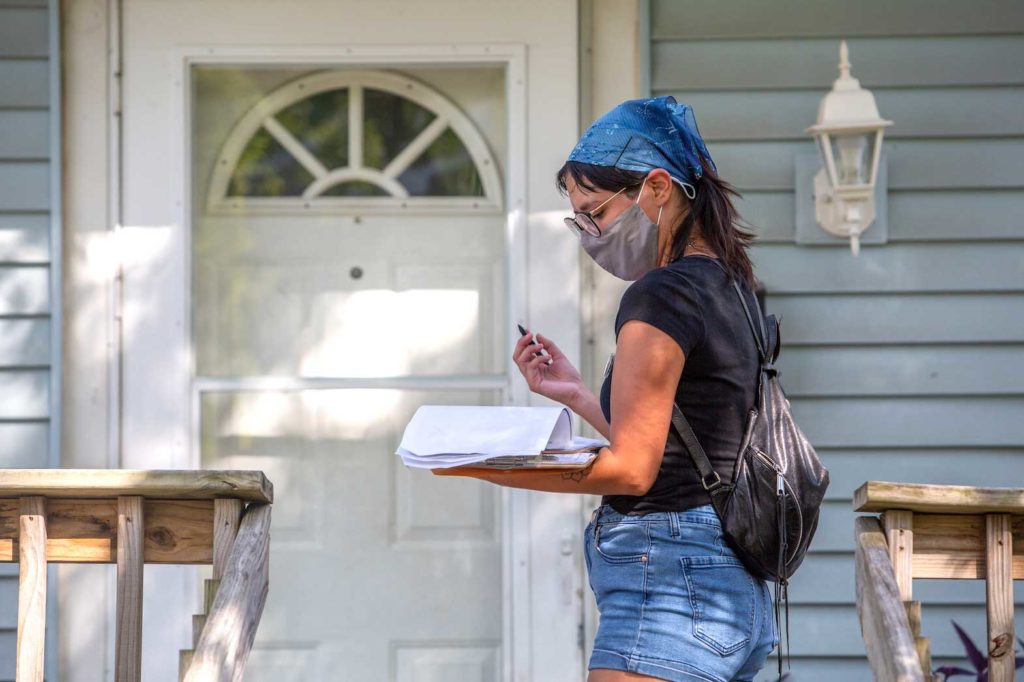Democrats counter Republican-led voter restrictions with early, aggressive outreach

Denver Foote, canvasser with Iowa Citizens for Community Improvement, CCI, makes notes as she knocks on doors to register people to vote in upcoming local elections in Des Moines, Iowa, U.S., August 23, 2021. REUTERS/Rachel Mummey
DES MOINES, Iowa – David Harris did not need an explanation when the two canvassers on his driveway asked him and his wife Jamie if they had heard about the new voting restrictions that the Republicans leading his state of Iowa had passed.
Amid former President Donald Trump’s false claims that his 2020 election loss to President Joe Biden was the result of widespread voter fraud, Iowa was the first state to enact major legislation in 2021 that Democrats argue is designed to favor Republicans by suppressing voter turnout.
The legislature shortened the state’s early and absentee voting period and limited who can collect and deliver another person’s absentee ballot. Republicans justify such curbs as needed to ensure election integrity and boost voter confidence, even though fraud is extremely rare in the United States.
The Harrises knew about the changes and were worried.
“As far as I’m concerned, it’s pushing us back, like where we were in the sixties. They’re trying to take rights away from us now,” said David, a business owner and Marine Corps veteran who is Black, referring to the civil rights campaigns for equality and easier access to voting for Black citizens.
“It’s discrimination,” added Jamie, who is white.
Encounters like these are part of an effort by liberal activists and Democrats to register and motivate voters earlier than usual – more than a year before the 2022 elections for the U.S. Congress.
The activists are uneasy, however, about how challenges to the restrictions may fare in court.
Legal experts said the hurdles are getting higher to prove certain voting rules are illegal given that the Supreme Court, with a 6-3 conservative majority, appears increasingly inclined to defer to state legislatures on election-related matters.
Republicans, who control a majority of state legislatures, will largely benefit, the legal experts said.
The stakes are high with Democrats trying to retain narrow control of Congress next year and the presidency in 2024. Iowa plays an important role in White House races, historically hosting the first caucuses that the two parties use to select candidates.
URGENCY
In Iowa, the sense of urgency is mounting. The paid canvassers who met the Harrises during a late-August prairie heatwave were from the Iowa CCI Action Fund, a progressive group based in Des Moines.
Going door-to-door to reach voters this early is unusual for the group, said Adam Mason, the state policy organizing director. “We have to take these barriers to voting on every way that we can.”
Other liberal groups, including an association of congregations on the state’s border with Illinois, and a new grassroots organization tied to the Democratic Party called the New Iowa Project have also begun outreach.
Since Jan. 1, 18 mostly Republican-led states have imposed 30 new laws that restrict voting, according to the Brennan Center for Justice at New York University.
For a graphic on U.S. states with new voting restrictions:
The raft of new Iowa measures, signed into law by Republican Governor Kim Reynolds in March and June, significantly reduce the power of local election officials and threaten criminal penalties if they do not comply. The laws shave an hour off poll openings and the time workers can take off to vote, and limit boxes where people can drop ballots to one per county.
The day after Iowa’s law came into force, the League of United Latin American Citizens sued in state court, claiming it violates the state constitution’s guarantee of the right to vote and that the fraud rationale was simply a ploy to suppress voters. In Iowa, there were just 27 convictions for various types of election misconduct, including fraud, since 2016, according to government figures.
The group’s Iowa political director Joe Enriquez Henry, said the law targets those who are more likely to vote absentee or lack flexible working hours, including the elderly, multiple-job holders and the poor.
“It appears Republicans don’t want democracy to prevail,” he said.
The Republican National Committee and other Republican groups has intervened in the case to help defend the legislation. The RNC’s chief counsel Justin Reimer said laws like Iowa’s are still “extremely voter friendly.” and that lawsuits against them only undermine the Democrats’ credibility.
“There are several areas in the election administration process which are susceptible to fraud,” Reimer said. “Regardless of how frequent you think it is, why would you leave the system open to the potential for it to happen?”
Lawsuits have been filed in other states that have enacted new laws as well, including in federal court in Georgia, and in state courts in Kansas and Wisconsin.
But election law experts and voting rights advocates expressed skepticism over whether those challenges will succeed. Though little-noticed by the public, conservative Supreme Court justices during the flurry of litigation around the 2020 election signaled skepticism over courts or state officials countering legislatures on election-related matters.
Then in July the high court made it easier for states to enact restrictions without violating the Voting Rights Act, a landmark 1965 law prohibiting racial discrimination in voting.
Enriquez Henry said the lawsuit is worth fighting despite the odds but voter outreach is also critical. If that does not work out, he said, “There is only one thing for people who want democracy and can’t get it to do, and that’s go into the streets to demand it.”
Voters like the Harrises say they will not be deterred by new restrictions. “Until we step up and take control of our state offices, our federal offices, we’re going to lose these battles,” Jamie Harris said.

